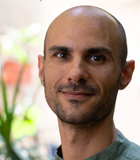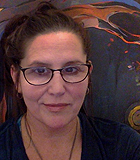Developing Artful and Liberating Ways of Looking within Our Emotional Life
This course has finished. Sign up for our notice list to be notified when this course is offered again.
Course Length: 9 weeks of instruction with three “break” weeks.
Dates: September 19 – December 8, 2021
(weeks of Oct. 3, Oct. 24, and Nov. 14 will have no meetings)
Main Meeting Time: Sundays at 5:30 pm – 7:15 pm UK time
Optional 45 min. Guided Meditation: Wednesday 5:15pm UK time
Q&A Sections: Either Sunday at 7:15 – 8:00 pm UK time OR Wed. 6pm – 6:45 UK time
(you will have the chance to specify at time of application which Q&A session times are possible for you)
Location: Online (Zoom)
Course Summary
This course will support committed meditators in developing skill and creativity in practicing with emotions and mind states. We will follow approaches and instructions given by Rob Burbea, and explore how to meet our emotional experience in ways that allow for more ease, spaciousness, and confidence within our emotional life – as well as the freedom to experience and respect the full range of our heart’s capacity. Cultivating familiarity and sensitivity with the emotional body / energy body will be a central practice, and we will explore how increasing our sensitivity and discernment regarding our emotional experience can support and deepen insight, samadhi, and Soulmaking Dharma practice. Within the course we will open questions and explorations into the nature of emotions, perception, and our experience of the world. The course will also include space for inquiry into the relationship between our emotional life and awakening.
Course Description
Cultivating emotional discernment and emotional capacity is an integral part of the path. This course will support committed meditators in developing skill and creativity in practicing with emotions and mind states. Having the freedom to relate to our emotions in different ways opens up dimensions of depth, beauty and meaningfulness within our lives. A lack of capacity and range in the way we work with and conceive of emotions will limit our practice and our relationships (with ourselves, with others, and with the world). When we are confident with our emotional expression, we are free to question or set aside limiting ideas of what awakening “looks like”, or how it might feel.
This course will be grounded in the meditative practices, approaches, and teachings of Rob Burbea. We will explore ways of practicing with emotion that support the deepening of insight, samadhi, and beautiful qualities of the heart. Cultivating familiarity and sensitivity with the emotional body / energy body will be a central practice. Teachings will aim to make connections between emotional work and other aspects of practice. We will explore assumptions about emotions that may limit us. How might we, through practice, be free of unnecessary suffering in regards to our inner life, while avoiding a flattening or oversimplification of emotional and psychological experience? How might we integrate dynamic forces like passion, anger and grief (so central to action and activism) in ways that are healing and empowering?
Developing these capacities is an important (and beautiful) part of the path of awakening, and this course is intended to support dharma practitioners who wish to work within these areas of cultivating depth, skill, and freedom through working meditatively with emotional experience. Increasing our emotional capacity and sensitivity is also a necessary foundation for working within the Soulmaking Dharma framework (as developed and taught by Rob Burbea and Catherine McGee).
While this is not a course in Soulmaking Dharma, the practices and approaches we will introduce will be valuable preparation for people interested in deepening their exploration of those specific teachings.
Some of the topics/practices this course will cover are:
- Becoming sensitive to the ways different emotions and mind states manifest as felt experience (working with the emotional/energy body)
- Developing modes of attention that simplify and clarify emotional experience.
- Increasing our capacity to differentiate between subtle elements of our emotional experience.
- Developing our capacity to be mindful of and work skillfully with thoughts in relationship to our emotional experience.
- Developing resources that allow for skill with challenging emotions.
- Developing samadhi through relating to the emotional/energy body.
- Increasing our sensitivity to subtle aspects of experience as meditators (in this case through attending to emotions) in ways that can also serve our insight and samadhi practice.
- Exploring and questioning our reactions and relationships to our emotional experience / state of mind.
- Seeing the fabricated, empty nature of perception and of the world through the way it’s shaped by emotional experience.
- Examining and exploring how we view the place of emotions (or relate to models of emotional perfection) in relationship to awakening.
Course Structure
The elements of the course are:
- Main Weekly Sessions (Sunday at 5:30 pm UK time): Each session will last 1 hour and 45 minutes. There will be guided meditation and instructions each week. We will offer teachings about the practices, as well as talks that explore the larger context of emotional work, meditation, and the path of awakening. Required.
- Q&A Sections of no more than 20 participants. They will last 45 minutes. You will be with the same Q&A section throughout the course. Q&A sections meet weekly at either 7:15 – 8 pm UK time on Sundays (after main meeting) OR Wednesdays at 6:00 – 6:45 pm UK time (after optional weekly guided meditation). When you register for the course you will be asked to indicate which Q&A section times are possible for you. Your group will meet with both Susy and Yahel (alternating between teachers). Required.
- Weekly 45 min guided meditation: offered on Wednesday at 5:15pm UK time. The Wednesday guided meditation is optional, and recording will be made available soon after the weekly session for participants.
Cost: We are happy to offer this course on Dana (donation) basis. As we consider the development of the Dharma in the West, we wish to explore the possibility to maintain this traditional way of mutual support between the community and the teachers. This means that everyone who meets the practice requirements of this course can attend, regardless of their financial situation. However, it also requires taking responsibility as we are able to. Both teachers are relying on Dana for their living, so we will ask you to seriously consider this matter. We suggest one takes into account these aspects: what you wish to give and feels right for you, taking responsibility for making the Dharma available / the dana system, and your available resources.
Prerequisites: It is expected that those who take the course will have a working familiarity with mindfulness and insight meditation, and a regular meditation practice. This course will not offer basic meditation instruction. Therefore, we ask that you:
- Have been practicing meditation for one year or longer & have a regular formal practice.
- Have attended at least 1 weeklong retreat or 2 weekend retreats.
- Practice with a group, community, or have recently taken other dharma courses.
- Have an interest in inquiring into the emotional life in ways that may open and enrich one’s practice.
If you do not meet those requirements exactly, but feel yourself to have equivalent experience, you will be able to clarify that on the application.
This course will approach working with emotions and mindstates from a dharma / meditator’s perspective. Participants can explore at their own pace, using the approaches we offer to support what each wishes to open and cultivate within their own practice. It is, therefore, a course suitable for those who feel comfortable and secure in exploring their own emotional experience at this point in their practice. If you have any questions about this please feel free to ask using the “contact” page.
Course Meeting Schedule
There are 9 weeks of meetings for the course over a 12 week period (while there are no Main Weekly meetings or Q&A sessions on the “skip” weeks, we will still offer the optional Wednesday guided sessions (and subsequent recordings) so you can continue to deepen and develop your practice.
(Please Note: For those who will be assigned a Sunday Q&A group, participation for Wednesday guided mediation is optional – so your only mandatory sessions are on Sundays. You will have the chance to specify if you are unable to participate in a Wednesday Q&A group at time of application).
Session Meeting Times:
Main Meeting Time: Sundays at 5:30 pm – 7:15 pm UK time
Q&A Sections: Either Sunday at 7:15 pm UK time OR Wed. 6pm UK time
Optional Guided Meditation: Wednesday 5:15pm UK time
Meeting Dates:
Sept. 19 – Main Meeting & Sunday Q&A Groups
Sept 22 – Optional Guided Meditation & Wed. Q&A Groups
Sept 26 – Main Meeting & Sunday Q&A Groups
Sept 29 – Optional Guided Meditation & Wed. Q&A Groups
-Week break, optional guided meditation offered Wed. Sept 29-
Oct 10 – Main Meeting & Sunday Q&A Groups
Oct 13 – Optional Guided Meditation & Wed. Q&A Groups
Oct 17 – Main Meeting & Sunday Q&A Groups
Oct 20 – Optional Guided Meditation & Wed. Q&A Groups
-Week break, optional guided meditation offered Wed. Oct 27-
Oct 31 – Main Meeting & Sunday Q&A Groups
Nov 3 – Guided Meditation & Wed. Q&A Groups
Nov 7 – Main Meeting & Sunday Q&A Groups
Nov 10 – Guided Meditation & Wed. Q&A Groups
-Week break, optional guided meditation offered Wed. Nov 17-
Nov 21 – Main Meeting & Sunday Q&A Groups
Nov 24 – Optional Guided Meditation & Wed. Q&A Groups
Nov 28 – Main Meeting & Sunday Q&A Groups
Dec 1 – Optional Guided Meditation & Wed. Q&A Groups
Dec 5 – Main Meeting & Sunday Q&A Groups
Dec 8 – Optional Guided Meditation & Wed. Q&A Groups
Teachers
This course will be taught by Yahel Avigur and Susy Keely, who were trained to teach by Rob Burbea. The course is offered at Rob’s request, with the intention to support those interested in deepening their exploration of the wide range of practices his teachings encompass.

Yahel Avigur is a devoted meditator and Dharma teacher who practices, lives and teaches in Tel Aviv.
In 2013, After practicing in Theravada and Insight Meditation traditions Yahel met the Dharma teacher Rob Burbea and became his student. Yahel was encouraged by Rob to teach the path of Emptiness to its depths, Rob’s unique approach to Jhana practice, and to train in teaching Soulmaking Dharma. Yahel emphasizes meditation as a path of sensitvity and attunement, which leads to liberating states of being and realizations. Yahel is also trained in Hakomi approach of assisted self study.

Susy Keely has practiced Buddhist meditation since 2001, and began practicing insight meditation five years later. In 2015 she began studying and training with Rob Burbea, and completed her teacher-training with him in 2020. She teaches meditation in Los Angeles, California, and is an artist and a parent. She is passionate about exploring the intersection between creative energies and contemplative practice, and supporting practitioners wishing to pursue deep practice in the midst of daily life.
